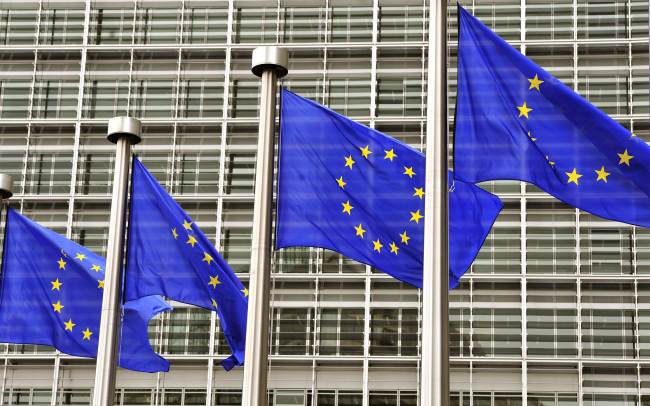Europe’s leaders meet to analyze euroskeptic poll wins
By Korea HeraldPublished : May 27, 2014 - 21:25
BRUSSELS (AFP) ― European leaders hold a summit in Brussels Tuesday, their first chance to digest the stunning success of euroskeptic and far-right parties at EU polls which has shaken the continent’s political landscape.
France’s President Francois Hollande called Monday for Brussels’ power to be reined in after what newspaper headlines called an “earthquake” in Europe.
That tremor was delivered by European voters backing euroskeptics in a stinging rebuke to Brussels, with France’s National Front and Britain’s UKIP leading the pack of anti-EU parties.
Hollande went on national television to call for the EU to reduce its role, which he said had become for many citizens “remote and incomprehensible.”
France’s President Francois Hollande called Monday for Brussels’ power to be reined in after what newspaper headlines called an “earthquake” in Europe.
That tremor was delivered by European voters backing euroskeptics in a stinging rebuke to Brussels, with France’s National Front and Britain’s UKIP leading the pack of anti-EU parties.
Hollande went on national television to call for the EU to reduce its role, which he said had become for many citizens “remote and incomprehensible.”

The embattled leader saw the far-right National Front come out on top in France’s vote, pushing his Socialist Party to a humiliating third place in the elections for seats in the European parliament.
“This cannot continue. Europe has to be simple, clear, to be effective where it is needed and to withdraw from where it is not necessary,” Hollande said in his address to the nation.
Across the Channel, British Prime Minister David Cameron faced a similar sentiment from voters, with the anti-EU U.K. Independence Party’s victory at the ballot box.
The European leaders will meet from 1700 GMT to take stock after the four days of voting across the 28-nation bloc, which came to a close on Sunday.
They will also discuss the election of the next president of the European Commission, the head of the EU executive.
The crisis in Ukraine is also on the agenda.
Ahead of the Informal European Council in Brussels on Tuesday, Cameron spoke to several of his counterparts saying they should learn from the election results, a statement from his Downing Street office said.
“The P.M. has been making the point ... that leaders should seize the opportunity of tomorrow’s dinner to heed the views expressed at the ballot box that the EU needs to change and to show it cannot be business as usual,” it said.
Cameron spoke to German Chancellor Angela Merkel, who experienced a different result with her own conservative party winning the poll in Germany.
“It’s quite remarkable and regrettable but now the point is to win those voters back,” said Merkel in reaction to the anti-EU trend elsewhere.
“A policy of competitiveness, growth and jobs is the best answer to the disappointment of those who voted in a way that we don’t like,” she said.
The pro-European Union parties must offer disillusioned voters the real prospect of jobs and growth, said French Prime Minister Manuel Valls, who ruled out stepping down after just weeks in office.
“Certainly there is a message across Europe of disillusionment with Europe and the EU has got to hear that loud and clear,” said Foreign Secretary William Hague in Britain, where Nigel Farage’s UKIP took 27 percent of the vote with Labour second and the Conservatives third.
Farage, promising more to come, said: “This is just about the most extraordinary result in British politics for over 100 years ... the penny has really dropped.”
European Commission head Jose Manuel Barroso put the best gloss on the outcome, stressing that, combined, the pro-EU camp of the center-right, center-left and Liberals would still have “a very solid and workable majority in the European Parliament.”
Analysts said anti-euro and anti-immigration parties had tapped into growing voter frustration after years in the economic doldrums pushed unemployment in Europe to record highs, while governments cut spending to balance the public finances at Brussels’ behest.
“The rise of populism in Europe has been accelerated with the economic crisis,” said Jean-Dominique Giuliani, from the Fondation Robert Schuman, a European research institute based in Paris and Brussels.
He said European institutions now need to draw up a “roadmap fixing priorities, with a time frame, including bridging the fiscal and social gap” between different member states.
Parliament’s latest projections give the center-right European People’s Party 213 seats in the new 751-seat assembly, with the Socialists on 190 and the ALDE Liberals on 64, followed by the Greens on 53.
The anti-EU vote should produce about 140 seats in all, giving them enough of a voice in the new assembly to live up to promises to weaken the EU from the inside.
Analysts noted, however, that these parties must get at least 25 MEPs from a minimum of seven of the EU’s 28 member states to form an official
Parliamentary group, and some might struggle to meet that requirement.
The FN will have 24 of the 74 seats for France. But UKIP, for example, refuses any ties with the FN because it says it is anti-Semitic, meaning the French group will have to look to smaller, extreme parties such as Holland’s Party for Freedom.
-
Articles by Korea Herald







![[Graphic News] More Koreans say they plan long-distance trips this year](http://res.heraldm.com/phpwas/restmb_idxmake.php?idx=644&simg=/content/image/2024/04/17/20240417050828_0.gif&u=)
![[KH Explains] Hyundai's full hybrid edge to pay off amid slow transition to pure EVs](http://res.heraldm.com/phpwas/restmb_idxmake.php?idx=644&simg=/content/image/2024/04/18/20240418050645_0.jpg&u=20240419100350)






![[From the Scene] Monks, Buddhists hail return of remains of Buddhas](http://res.heraldm.com/phpwas/restmb_idxmake.php?idx=652&simg=/content/image/2024/04/19/20240419050617_0.jpg&u=20240419175937)

![[KH Explains] Hyundai's full hybrid edge to pay off amid slow transition to pure EVs](http://res.heraldm.com/phpwas/restmb_idxmake.php?idx=652&simg=/content/image/2024/04/18/20240418050645_0.jpg&u=20240419100350)

![[Today’s K-pop] Illit drops debut single remix](http://res.heraldm.com/phpwas/restmb_idxmake.php?idx=642&simg=/content/image/2024/04/19/20240419050612_0.jpg&u=)